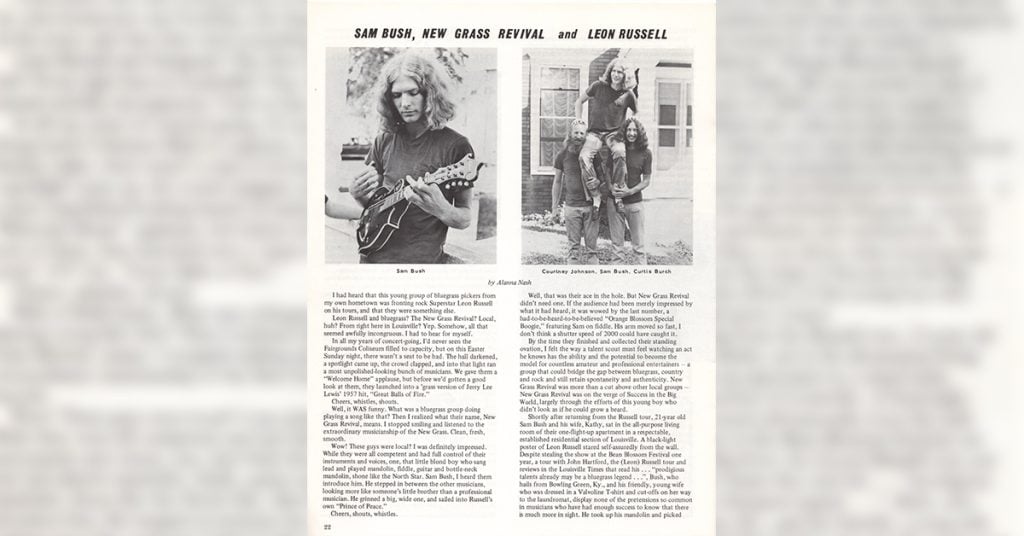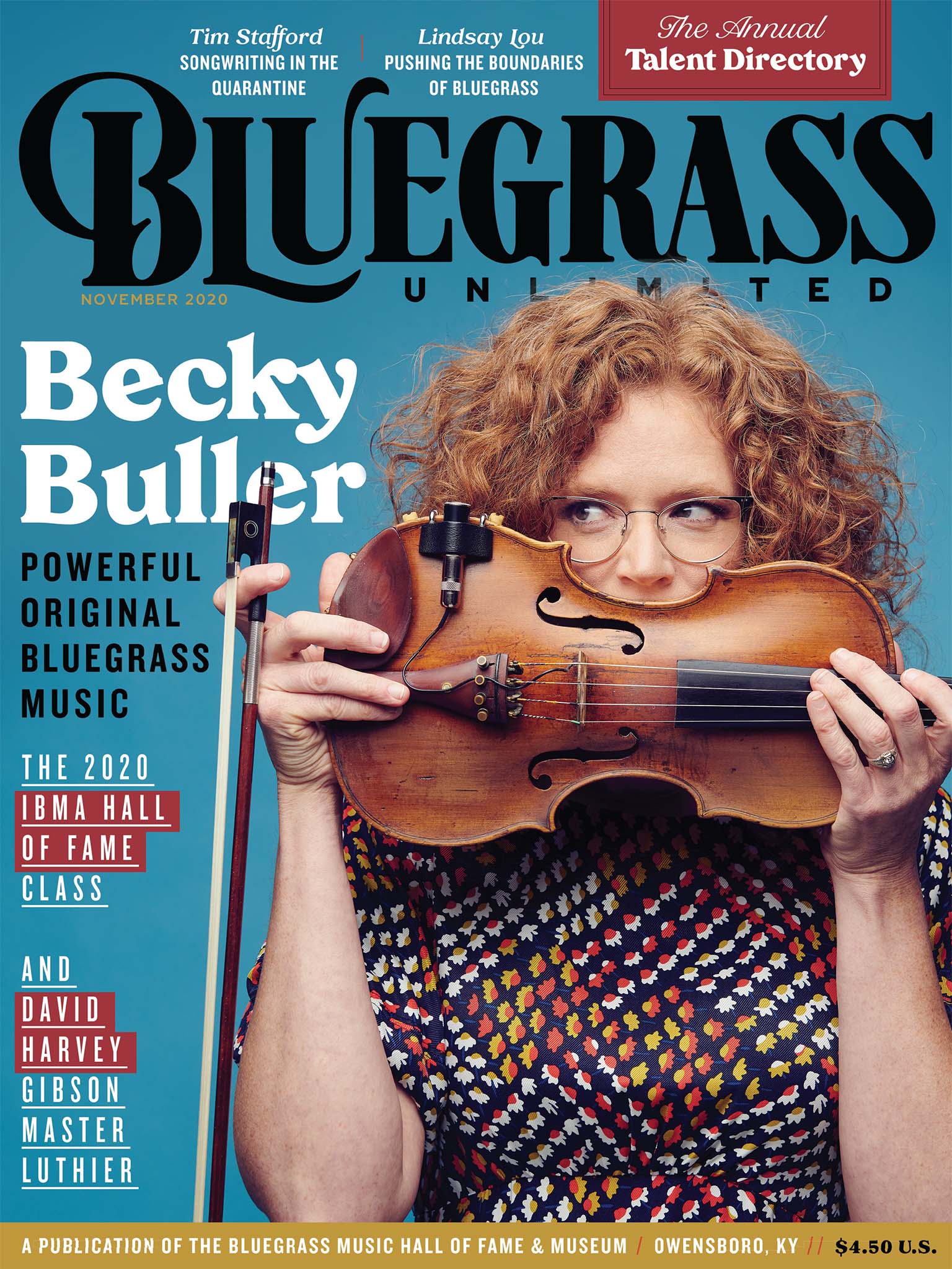Home > Articles > The Archives > Sam Bush, New Grass Revival and Leon Russell
Sam Bush, New Grass Revival and Leon Russell
Reprinted from Bluegrass Unlimited Magazine
Volume 8, Number 4, October 1973
I had heard that this young group of bluegrass pickers from my own hometown was fronting rock Superstar Leon Russell on his tours, and that they were something else.
Leon Russell and bluegrass? The New Grass Revival? Local, huh? From right here in Louisville? Yep. Somehow, all that seemed awfully incongruous. I had to hear for myself.
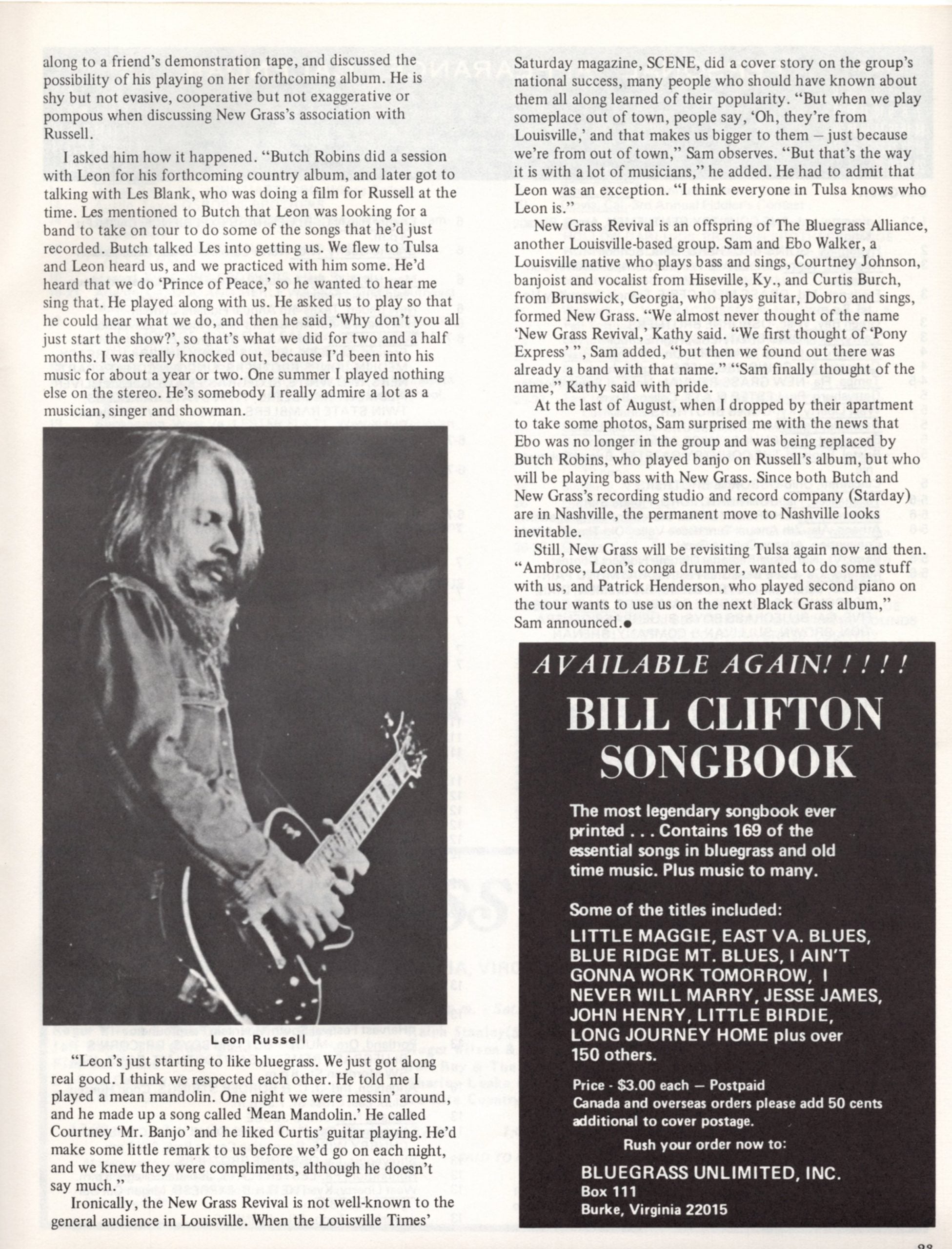
In all my years of concert-going, I’d never seen the Fairgrounds Coliseum filled to capacity, but on this Easter Sunday night, there wasn’t a seat to be had. The hall darkened, a spotlight came up, the crowd clapped, and into that light ran a most unpolished-looking bunch of musicians. We gave them a “Welcome Home” applause, but before we’d gotten a good look at them, they launched into a ’grass version of Jerry Lee Lewis’ 1957 hit, “Great Balls of Fire.”
Cheers, whistles, shouts.
Well, it WAS funny. What was a bluegrass group doing playing a song like that? Then I realized what their name, New Grass Revival, means. I stopped smiling and listened to the extraordinary musicianship of the New Grass. Clean, fresh, smooth.
Wow! These guys were local? I was definitely impressed. While they were all competent and had full control of their instruments and voices, one, that little blond boy who sang lead and played mandolin, fiddle, guitar and bottle-neck mandolin, shone like the North Star. Sam Bush, I heard them introduce him. He stepped in between the other musicians, looking more like someone’s little brother than a professional musician. He grinned a big, wide one, and sailed into Russell’s own “Prince of Peace.”
Cheers, shouts, whistles.
Well, that was their ace in the hole. But New Grass Revival didn’t need one. If the audience had been merely impressed by what it had heard, it was wowed by the last number, a had-to-be-heard-to-be-believed “Orange Blossom Special Boogie,” featuring Sam on fiddle. His arm moved so fast, I don’t think a shutter speed of 2000 could have caught it.
By the time they finished and collected their standing ovation, I felt the way a talent scout must feel watching an act he knows has the ability and the potential to become the model for countless amateur and professional entertainers — a group that could bridge the gap between bluegrass, country and rock and still retain spontaneity and authenticity. New Grass Revival was more than a cut above other local groups — New Grass Revival was on the verge of Success in the Big World, largely through the efforts of this young boy who didn’t look as if he could grow a beard.
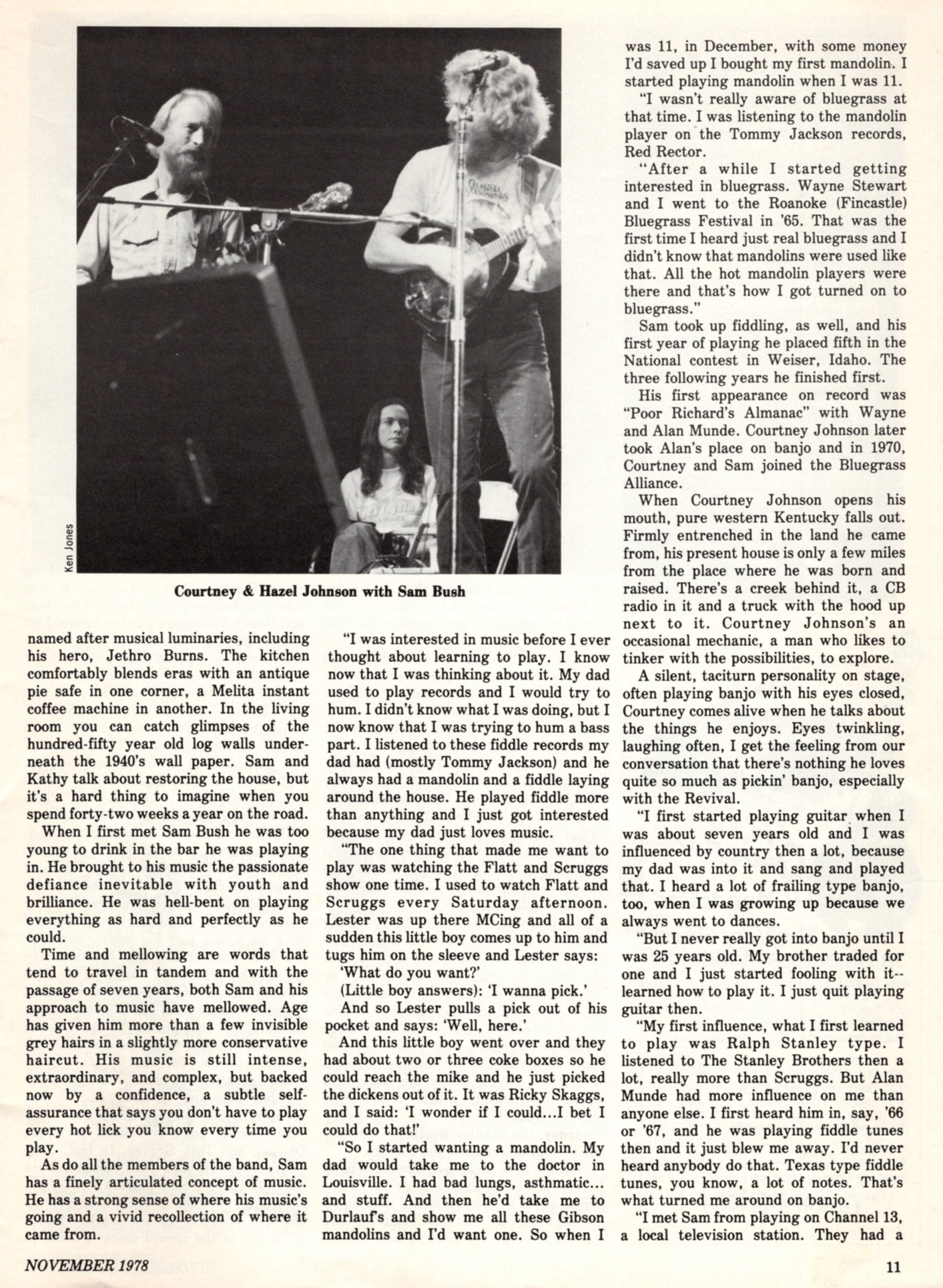
Shortly after returning from the Russell tour, 21-year old Sam Bush and his wife, Kathy, sat in the all-purpose living room of their one-flight-up apartment in a respectable, established residential section of Louisville. A black-light poster of Leon Russell stared self-assuredly from the wall. Despite stealing the show at the Bean Blossom Festival one year, a tour with John Hartford, the (Leon) Russell tour and reviews in the Louisville Times that read his… “prodigious talents already may be a bluegrass legend …”, Bush, who hails from Bowling Green, Ky., and his friendly, young wife who was dressed in a Valvoline T-shirt and cut-offs on her way to the laundromat, display none of the pretensions so common in musicians who have had enough success to know that there is much more in sight. He took up his mandolin and picked along to a friend’s demonstration tape and discussed the possibility of his playing on her forthcoming album. He is shy but not evasive, cooperative but not exaggerative or pompous when discussing New Grass’s association with Russell.
I asked him how it happened. “Butch Robins did a session with Leon for his forthcoming country album, and later got to talking with Les Blank, who was doing a film for Russell at the time. Les mentioned to Butch that Leon was looking for a band to take on tour to do some of the songs that he’d just recorded. Butch talked Les into getting us. We flew to Tulsa and Leon heard us, and we practiced with him some. He’d heard that we do ‘Prince of Peace,’ so he wanted to hear me sing that. He played along with us. He asked us to play so that he could hear what we do, and then he said, ‘Why don’t you all just start the show?’, so that’s what we did for two and a half months. I was really knocked out, because I’d been into his music for about a year or two. One summer I played nothing else on the stereo. He’s somebody I really admire a lot as a musician, singer and showman.
Leon’s just starting to like bluegrass. We just got along real good. I think we respected each other. He told me I played a mean mandolin. One night we were messin’ around, and he made up a song called ‘Mean Mandolin.’ He called Courtney ‘Mr. Banjo’ and he liked Curtis’ guitar playing. He’d make some little remark to us before we’d go on each night, and we knew they were compliments, although he doesn’t say much.”
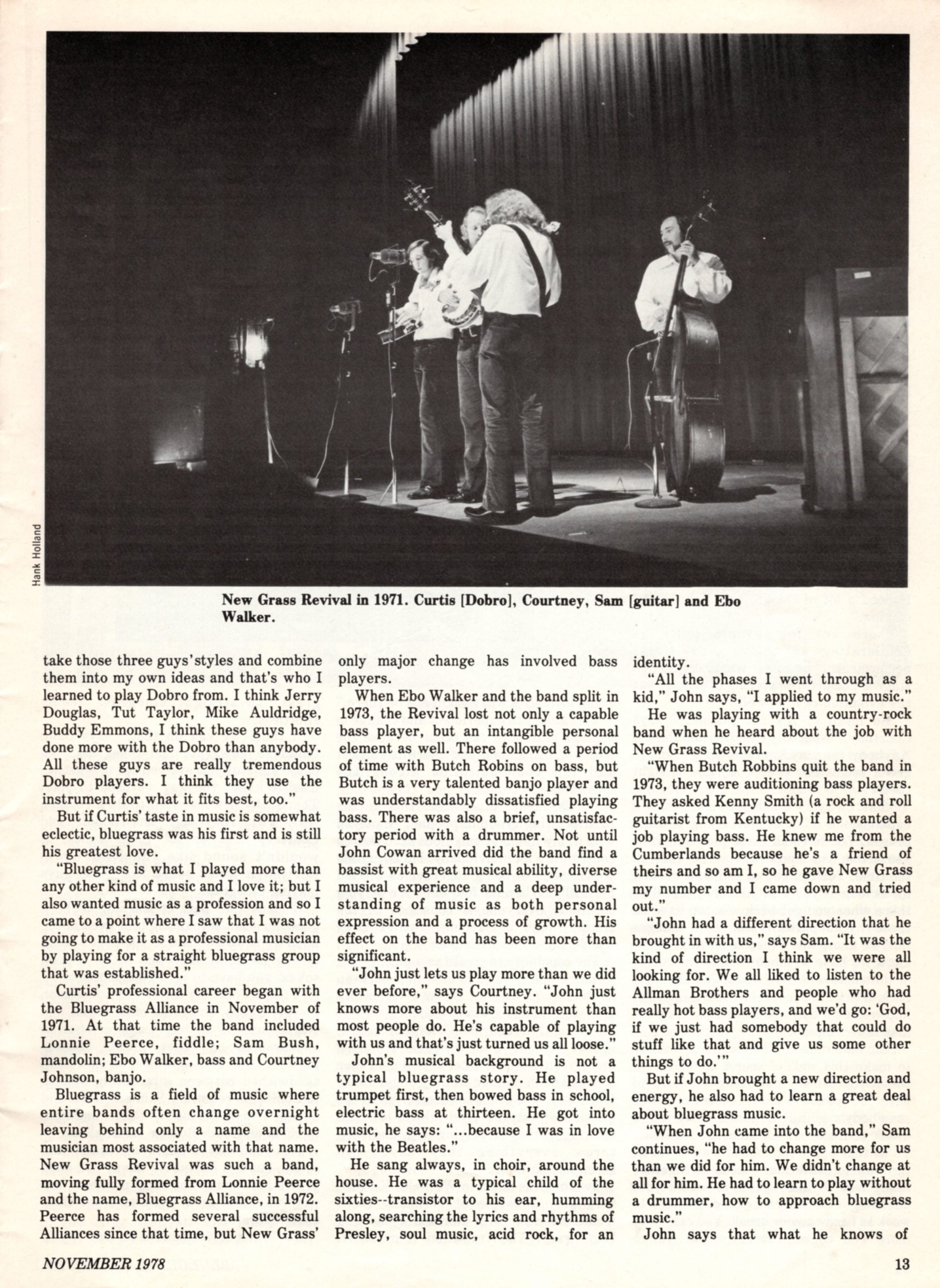
Ironically, the New Grass Revival is not well-known to the general audience in Louisville. When the Louisville Times’ Saturday magazine, SCENE, did a cover story on the group’s national success, many people who should have known about them all along learned of their popularity. “But when we play someplace out of town, people say, ‘Oh, they’re from Louisville,’ and that makes us bigger to them — just because we’re from out of town,” Sam observes. “But that’s the way it is with a lot of musicians,” he added. He had to admit that Leon was an exception. “I think everyone in Tulsa knows who Leon is.”
New Grass Revival is an offspring of The Bluegrass Alliance, another Louisville-based group. Sam and Ebo Walker, a Louisville native who plays bass and sings, Courtney Johnson, banjoist and vocalist from Hiseville, Ky., and Curtis Burch, from Brunswick, Georgia, who plays guitar, Dobro and sings, formed New Grass. “We almost never thought of the name ‘New Grass Revival,’ Kathy said. “We first thought of ‘Pony Express’ ”, Sam added, “but then we found out there was already a band with that name.” “Sam finally thought of the name,” Kathy said with pride.
At the last of August, when I dropped by their apartment to take some photos, Sam surprised me with the news that Ebo was no longer in the group and was being replaced by Butch Robins, who played banjo on Russell’s album, but who will be playing bass with New Grass. Since both Butch and New Grass’s recording studio and record company (Starday) are in Nashville, the permanent move to Nashville looks inevitable.
Still, New Grass will be revisiting Tulsa again now and then. “Ambrose, Leon’s conga drummer, wanted to do some stuff with us, and Patrick Henderson, who played second piano on the tour wants to use us on the next Black Grass album,” Sam announced.
